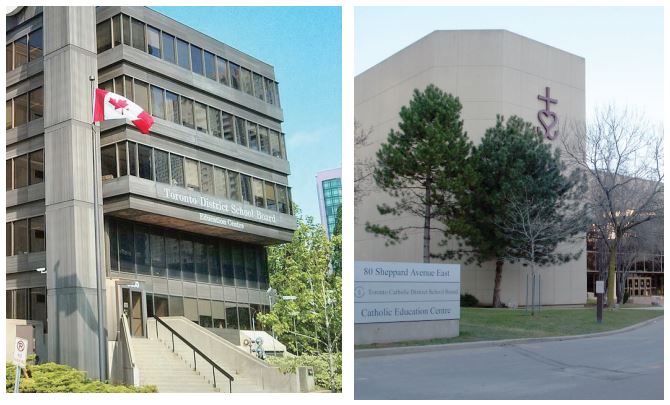School boards reject remedial strategies and obligations

TORONTO – Following Monday’s summary of the “educational environment” at the TCDSB, several trustees and Senior staff from Boards of Education in the greater GTA weighed in “on background” to inform us that the situation may be worse than what we described.
In their view, some “bad apples” who have been given “an easy ride” are putting the entire publicly funded school system (Catholic and Public) at risk.
The real agenda, they say, is to eliminate the “local boards system” and recreate a “one big, unelected board” system run out of the Ministry of Education offices at Queen’s Park.
As proof, they point to the Court case being heard today where a sixteen-year-old non-Catholic is challenging the York Catholic District School Board for her right to seek election as trustee. If true, Catholic haters will have ramped up their efforts to include manipulation of children (minors) to undermine parental rights in one monolithic system.
That is a discussion for another day. For today, as in previous articles on education, we will stay with the theme of achievement, or, more accurately, lack thereof, in what is the most important change agent for any child outside the influence of their parental home – the school.
What has interested our readership (Catholic, Italian or both) has been the academic performance witnessed at the schools attended by their children or grandchildren. They take for granted that the social-cultural context is the one they, as Catholic parents, expect will form the basis for the “values development” of their children. Yet, some of those “bad apple” trustees and administrators are weakening the Catholic system from within.
On the “purely” academic side (reading, writing, arithmetic), there are several “instruments” available on which to base assessments and comparisons. For more than 20 years, the Fraser Institute’s school rankings website has been the go-to source for parents and educators to measure school performance.
Every year, the Fraser Institute publishes a series of School Report Cards that rank the academic performance of elementary and secondary schools in Ontario. These rankings are based on Grade 3, Grade 6, Grade 9 Education Quality and Accountability Office (EQAO) test results and Grade 10 Ontario Secondary School Literacy Test (OSSLT) results. The tests are Ministry mandated.
The rankings come with detailed report on how each school is doing in academics compared to other ranked schools (those that participate, 3037 elementary schools, in 2018-2019 before Covid).
The rankings show whether the school’s results are improving, declining, or just staying steady over the most recent five years. They are a learning tool for schools and school boards. If they use it.
The Toronto District School Board (TDSB), the “public” board, does not feel obligated to do so and warns parents that a ranking system is not a fair assessment of student success. Its website is accusatory towards parents who make quick judgements about quality of education based on the test results.
For them it is a game. For parents it is about assessing the quality of education being offered their children. Grudgingly, the TDSB admits that the tests results from EQAO/OSSLT on which the rankings are based do indeed provide the TDSB with valuable information. And in a petulant tone says … “there is no evidence that shows ranking schools improves student learning”. Right, agreed! That would only do so if the Board were to develop and implement the teaching strategies to bring about that improvement.
The Catholic Co-terminus board, the TCDSB, is even more derelict or more devious. Here is the gobbledygook they post on their website:
“Student achievement results are considered key indicators of educational quality. Student achievement on EQAO mathematics assessments can be interpreted meaningfully only in the context of the system that produced them. EQAO includes in its reporting of achievement results, demographic and environmental information to understand student achievement in context, and to help determine improvement strategies that enable all students to achieve the Ontario Curriculum expectations for Mathematics.”
Our readers may not be surprised to read some of the results we will publish in our next edition.



